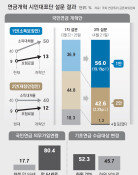Gov’t should deregulate market to prevent possible April crisis
Gov’t should deregulate market to prevent possible April crisis
Posted March. 17, 2017 07:13,
Updated March. 17, 2017 07:19
The U.S. Federal Reserve raised its benchmark interest rate by more than 0.25 percentage points on Wednesday (local time) to a range of 1 percent in eight years. This was the second interest rate hikes in three months after December 2016 and the first one after 2008 when Washington-triggered financial crisis hit the world, all of which is the sign that the U.S. economy is in good shape. As Federal Reserve Chairwoman Janet Yellen announced the board’s decision on interest rates, all three indexes of domestic stock prices, bond and Korean won have increased in the Korean market.
In a good economic condition, Korea would have seen the recovery of U.S. market, the largest consumer in the world, as a favorable factor. That, however, was not the case as the Korean government and the Bank of Korea finished the macro-economic and financial meeting at 3:00 a.m. Thursday when the result of the Federal Open Market Committee (FOMC) meeting came out. To prevent foreign investment from being drained, Seoul needs to increase its benchmark interest rates but the household debts accounting for whopping 1,345 trillion Korean won (approx. 1.19 trillion U.S. dollars) is the powder keg. If the mortgage rates, currently standing at an average of 3.2 percent, goes up by 0.5 percentage points, the interest burden of another 7 trillion won (approx. 6.2 billion dollars) will be added to the current level at 43 trillion won (approx. 38 billion dollars). That will return as a financial bomb to the marginalized families such as some 2 million low income households, the self-employed and people with bad credits.
To make matters worse, Korea is now hit by multiple unfavorable factors such as China’s revenge to THAAD deployment, bankrupted Daewoo Shipbuilding & Marine Engineering and U.S. announcement for currency-manipulating nations, expanding the rumor of possible crisis in April. “It is highly unlikely that we have April crisis. Even so, we could make sufficient response to it,” Deputy Prime Minister Yu Il-ho for Economic Affairs said at Foreign Economic Ministers' Meeting in February. This, however, sounds too optimistic. “We will make early execution of public finance by 58 percent during the first half of 2017 and allocate grants for local government in a swift manner,” Yu also said in December last year when Washington had its second interest rates. However, no one could explain how much has changed over the course of three months.
While the government, with the help of national research centers, has contended that we need to bring down interest rates since late last year, the Bank of Korea has continuously stressed financial roles. Passing the blame to each other will never help Korean economy overcome its crisis. The central bank should release the policy funds to support small- and medium-sized companies so that interest rates wouldn’t skyrocket. The government is advised to bring about deregulation policies so that companies with cashable assets of some 547 trillion won (approx. 485 billion dollars) would make intensive investment in the promising sectors for future growth, which may create more job opportunities and enhance export competitiveness. While some say that discussion over supplementary budget should be initiated given the situation where monetary policy seems to be lost in the market, now is not the time for that as we are already making early execution of the national budget.







